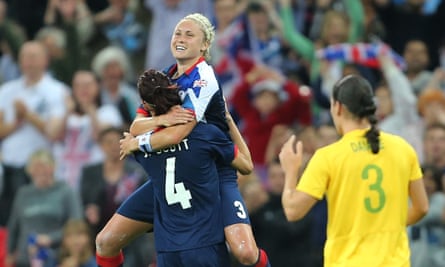Steph Houghton has played such a transformative role in making women’s football part of the national conversation that the game will inevitably feel a poorer place when she retires at the end of this season.
The Manchester City centre‑half and former England captain prompted richly deserved plaudits on Wednesday night as she announced the decision to hang up her boots at the conclusion of the campaign this spring.
As the first female to grace the cover of Shoot football magazine, Houghton was at the vanguard of her sport’s metamorphosis from niche to mainstream and her amalgam of assured on-pitch leadership and hallmark humility off it will be much missed. At 35 she is bringing the curtain down on a 20-year career spanning four clubs – Sunderland, Leeds, Arsenal and Manchester City – and 16 domestic trophies, the latter eight secured during 10 years and 241 appearances for City.
Now, as the sole survivor from City’s first professional team a decade ago, a defender capped 121 times by England between 2007 and 2021 and a star of four major tournaments, hopes to sign off by helping Gareth Taylor’s squad to clinch this season’s Women’s Super League title.
Fittingly, Taylor led the tributes to a woman whose private life is dominated by caring for her husband, Stephen Darby. The former Liverpool, Bradford and Bolton defender was diagnosed with motor neurone disease in 2018, just three months after their wedding. “Steph is – without question – an icon of the game. Her legacy will be felt for so many years to come,” Taylor said. “She’s paved the way for so many to thrive in the future.
“Steph has lived and breathed football for such a long time, and she leaves it in the strongest place it has ever been – a true testament to her leadership, hard work, talent, and dedication.
“I feel incredibly privileged to have been able to work with her and know her name will be written into the history books as a true footballing great.”
The Wearside-born Houghton was made England captain by Mark Sampson in 2014 and repaid his faith by leading the Lionesses to a bronze medal at the 2015 World Cup in Canada, in addition to the semi‑finals of Euro 2017 in the Netherlands and the 2019 World Cup in France.
A woman who also represented Team GB at London 2012 and the delayed Tokyo 2020 Olympics, Houghton is a driving force in the Darby Rimmer MND Foundation. Since its foundation less than five years ago the charity Darby established alongside the late fellow MND sufferer Chris Rimmer, has raised more than £1.3m to fund medical research in addition to providing a support network for those diagnosed with the disease. Houghton, who is a sports science graduate from the University of Loughborough and also worked part-time at Hertfordshire University before turning pro, could hardly have imagined how her life would have unfolded when she made her debut for Sunderland in 2002, an era when even the most gifted women frequently paid to play.
“The game has moved so quickly from amateur to professional over the last 20 years. I thank the trailblazers that came before me … and I hope I leave the game in a better place than when I started,” she said on Wednesday night. “I hope I have in some small way contributed to giving the girls of tomorrow a better future in football. Taking the decision to retire is such a difficult thing to do. Football has been my life, my passion and I have loved the career I have had.”

Twenty-two years ago, the idea of women earning a living as professional footballers seemed laughable but the sheer determination, not to mention burgeoning excellence, of Houghton and her fellow Sunderland teammates, perhaps most notably Jill Scott and Lucy Bronze, turned that notion on its head. Small wonder the lifelong Sunderland supporter graduated from being the only girl in the football team at her County Durham primary school in South Hetton to being awarded an MBE in 2016 for achievements in the women’s game.
after newsletter promotion
Along the way Houghton overcame several serious injuries including a badly broken leg, anterior cruciate ligament rupture and torn achilles tendon but England ultimately broke her heart.
Indeed the biggest disappointment for Houghton’s many fans is that Sarina Wiegman never offered her an opportunity to extend an international career ended by an injury sustained in training shortly before Wiegman’s first game in charge as England manager in September 2021.
That omission will have saddened the Dutch coach’s predecessor, Phil Neville. “Steph’s a wonderful, wonderful person,” England’s former manager said during France 2019. “Steph’s so humble, she never wants it to be all about her but her leadership is incredible. What she’s going through [with her husband’s illness] is horrific but you’d never know. She just gets on with things. She’s a brilliant player – and an even better person.”
Wiegman said on Wednesday: “Steph deserves all the praise she will rightly receive for her remarkable career. I know she has been inspiring so many young girls to follow in her footsteps. I look forward to being able to celebrate her achievements at one of our games later this year.”
Baroness Sue Campbell, the FA’s director of women’s football, said: “Steph has played a huge part in the growth of women’s football and her impact transcends not just football but across sport. She has been the epitome of a role model. We’ve been lucky to have her.”
Source: theguardian.com


















